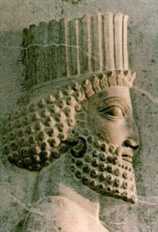October 29: The Faith of Cyrus the Great
Cyrus the Great Conquers Babylon (539 BCE):
The End of the Babylonian "Captivity"
It was on this date, October 29, 539 BCE, that the city of Babylon fell to the army led by Cyrus the Great (576-7/529 BCE), Emperor of Persia.[1] The city of Babylon, which was located south of Baghdad in what is now Iraq, never lived up to its scarlet reputation: it was reviled by Christians as a sink of immorality, vice and depravity, based on its characterization in the biblical book of Revelation. This was the legacy of Babylon, during the Hebrew captivity, before it was conquered by Cyrus (کوروش بزرگ; Old Persian: Kūruš), that was told in delicious detail by the Greek historian Herodotus, who never saw the city. The description was later given a measure of currency by the usually careful historian Sir James G. Frazer.
Here is what Herodotus tells and Frazer repeats 2340 years later:
...at Babylon every woman, whether rich or poor, had once in her life to submit to the embraces of a stranger at the temple of Mylitta, that is, of Ishtar or Astarte, and to dedicate to the goddess the wages earned by this sanctified harlotry. The sacred precinct was crowded with women waiting to observe the custom. Some of them had to wait there for years.[2]
This lurid slander on the ancient city was lapped up by Christians eager to show their moral superiority to pagans. But here history gets in the way of mythology: Babylon is the soil in which the Hammurabi Code matured about 4,000 years ago, in a time when the Hebrews were illiterate polytheists. That code, which its author says was man-made, not handed down from any god, asserts more rights for women and more justice for working people than any code of law until modern times. Temple prostitution was sometimes known in ancient cultures, but not in Babylon: indeed, marriage-tablets discovered in archaeological research show that brides were commonly listed as virgins.
The Babylonians had their moral code and their religion – including the belief that the gods would punish sin in this life – which is a significantly better moral enforcer than the hell of the Christians who later sneered at the Babylonians. When Cyrus came calling, he took the city peacefully. Then he did something amazing: he let the people keep their religions and customs. He even sacrificed to their local gods. Cyrus was more administrator than tyrant over Babylon.
Then, in as an act of piety, or as a shrewd political move, he released the Jews from their 70 years of "Babylonian Captivity." Whatever his motivation, Cyrus returned the idols and accoutrements of the many religions to their Babylonian devotees, including the Hebrews. It was a strange sort of captivity: Babylon was wealthy and cosmopolitan, and there the Hebrews learned literacy. After their release, during what we call the Post-Exilic period, the Hebrews forged (in both senses of the word) their best moral and ethical works, revised their history to erase most traces of their earlier polytheism, improvised a cult of Yahveh and a biography of Moses (who may or may not have been real), and generally created a justification for their priesthood.
Indeed, the story of the baby Moses, born in secret and set adrift on the Nile in an ark of reeds, who is fortuitously rescued and becomes a great leader (Ex. 2:2-7) was adapted from the Babylonian legend from some eight centuries earlier of Sargon of Akkad, the famous king of Mesopotamia! [3]
The "Whore of Babylon," which in the Book of Revelation (chapters 17 and 18) refers either to the Roman emperor, or to the power of the Roman Empire, cannot be taken literally to refer to the city of Babylon itself: there was no Christian community there until after the Revelation was written. And the Hebrews Cyrus (known in the Old Testament as כורש) released to return to Jerusalem? They considered Babylon so evil... that most of the exiled Hebrews preferred to stay in "captivity." It seems they had gotten used to a cultured community without the yoke of Yahveh!
[1] Some sources give this date as 538 BCE.
[2] Sir James George Frazer, The Golden Bough, 1900, chapter 31.
[3] Some Bible commentators put the birth of Moses (if he was not invented along with the rest of Hebrew history) at 1525 BCE – clearly later than Sargon (2334-2279 BCE).
Originally published October 2003 by Ronald Bruce Meyer.



